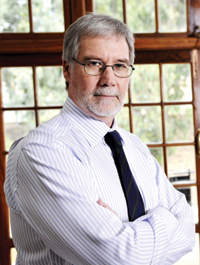Postdocs vital to 'brain circulation' in Africa
27 July 2009
It was only after the release of his memoirs that we at UCT learnt that Ralph Bunche, American political scientist and Nobel Peace Prize winner (1950), had spent time at this university as a postdoctoral research fellow under Professor Isaac Schapera in the 1930s.
Bunche's stint here followed his doctoral research in anthropology at the London School of Economics (1936-1938).
Until recent years, little record was kept of our postdoctoral research fellows - and yet they have made, and continue to make, a substantial contribution to UCT's research output.
Indeed, it is fair to say that 'postdocs' are an indispensable part of the research endeavour of UCT - as they are at any modern university.
We have come to realise that, at a central level, the university has to step up its support for these highly productive and valuable members of our community. The Postgraduate Funding Office has taken the lead in this, and the Board for Graduate Studies has made the facilitation of increased support to postdoctoral research fellows a focal point of its work for this year.
Today UCT has 168 postdoctoral research fellows distributed throughout the six faculties, but primarily located in the science and health sciences faculties. The University is keen to increase the number of postdocs in the other faculties - and of course, in the university as a whole - and to this end the University Research Committee is constantly looking for ways to increase the number of fellowships for postdoctoral research.
These fellowships are usually awarded to individuals within five years of them having achieved their doctoral degrees. Fellowships are negotiable up to three years (and sometimes even longer - under exceptional circumstances, an extension may be considered for up to a maximum of five years).
The purpose of the Postdoctoral Research Fellowship is to provide an opportunity for experiential learning in research. In many instances, this serves as a path for further academic and professional development. (Technically, the postdoctoral research fellows are neither students nor employees of the university, but occupy a unique niche: they do not earn salaries, and their work is funded through Postdoctoral Research Fellowships).
We salute our postdoctoral research fellows for having chosen to make South Africa - and UCT - their research home. It is important that we should have a 'brain circulation' rather than the 'brain drain' that is such a worry to the whole of our continent. Africa's tertiary sector is under enormous pressure. A recent statement by the Network of African Science Academies (NASAC) states that one-third of all African scientists live and work in developed countries, "the outflow representing a significant loss of economic potential". Postdoctoral fellowships can help to keep young scientists in Africa, and to bring them home after doctoral studies abroad - and, of course, to introduce our research opportunities to budding researchers from all over the world.
Through this special supplement we wish to highlight and acknowledge the vital contribution made to our research enterprise by our postdoctoral research fellows.
 This work is licensed under a Creative Commons Attribution-NoDerivatives 4.0 International License.
This work is licensed under a Creative Commons Attribution-NoDerivatives 4.0 International License.
Please view the republishing articles page for more information.







